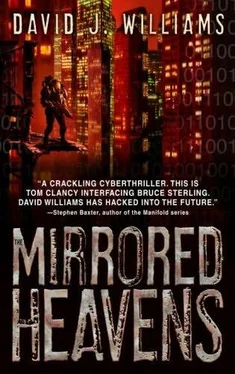“It wants us to follow,” she says.
“You hadn’t figured that out yet.”
“What choice do we have?”
“What choice indeed?”
“It’s speeding up.”
It’s moving out beyond the complex. She has no idea where it’s going, but can see quite clearly that it’s picking up the pace. And now she and Marlowe are doing the same—racing through the machinery that’s busy feeding power to all the chaos now raging far behind. The place isn’t small. It takes them almost ten minutes to get to the farside—and another five minutes to find the hole in the back of the disused chamber that leads…
“Due north,” says Haskell. “Straight out to sea.”
“Let’s do it,” says Marlowe.
They proceed down the new tunnel, firing their thrusters intermittently. But mostly they’re just walking now. The tunnel around them is starting to change. Metal replaces stone. Plastic replaces metal. They transition into a corridor once more.
Only this one’s different. It’s much more cramped. They can hear the hum of a power source around them. And soon they can discern insignias on the walls and ceiling.
“Do you recognize those?” asks Haskell.
“Indian military,” replies Marlowe.
“ Indian?”
“Why not? They used to own this.”
Back when India mattered. Back before the Coalition crushed her. Long time gone now—even though she used to have such reach. Several kilometers off the coast of New Guinea: that’s where one of her limbs got severed. That’s where one lies forgotten.
“What are we in ?” mutters Haskell.
“Legacy,” replies Marlowe. “The Indian Republic maintained mobile underwater fortresses. Like any naval power. Apparently one got buried off the coast of New Guinea. And here we are.”
“And here’s where the Manilishi’s waiting for us,” says Haskell.
“Along with its masters,” he replies.
She nods. They keep moving.
 The stairs end in a tunnel. They start making haste along it, moving due south now. They advance through into what looks to be a natural cave, transition back into another tunnel. Their lights play along the walls, ceiling.
The stairs end in a tunnel. They start making haste along it, moving due south now. They advance through into what looks to be a natural cave, transition back into another tunnel. Their lights play along the walls, ceiling.
“This should take us beyond the border,” says Spencer.
“This being what?”
“These are smugglers’ tunnels.”
“Yeah? Smuggling what?”
“Mostly drugs. But sometimes humans.”
“And you hooked up with these guys how?”
“Bit of a six degrees of separation thing,” says Spencer.
“Yeah?”
“Yeah. The border’s honeycombed with this shit. Some of it was dug during the wars across the last thirty years. Some of it’s much older. Some of it was here all along.”
“And the Americans don’t know about this?”
“They know that this kind of stuff goes on, sure. Tunnels under borders aren’t exactly new. But they haven’t found them all. They’re concentrating on the ones they’ve linked to Jaguar activity. As for the others: a little bit of merchandise, a little bit of traffic—who cares? Border units don’t exactly command top-drawer salaries. Sometimes everybody can win.”
“Do you think we’re winning now, Spencer?”
“We will be if we can make it another four fucking kilometers.”
But now the passage intersects with another one that’s set against it at a right angle. Spencer looks left, then right. Then at the wall in front of them.
“What’s wrong?” asks Linehan.
“What’s wrong is that this isn’t supposed to be here. We were supposed to go straight on through. There’s not supposed to be an intersection here.”
“Looks like you’ve been misinformed.”
“We’re turning left.”
“Have it your way.”
They turn left. Another quarter-klick and the passage grows wider. It seems noticeably older. The ceiling seems to have some kind of glaze on it. Carvings start to appear on the walls—abstract shapes and patterns. The passage bends south again.
“Guess this was the right choice,” says Spencer.
The tunnel grows even wider. The carvings are starting to become noticeably less abstract. They’re stylized animals: llamas, birds, crocodiles.
“This doesn’t look modern,” says Linehan.
“Evidently not,” replies Spencer.
The passage widens still farther, broadens out into a gallery. A massive pedestal sits on the far end. Two massive chairs sit atop that pedestal. Stone figures sit within those chairs. The walls and ceiling are alive with images—animals bearing swords, humans wearing headdresses, stars emitting radiance….
“I don’t see a way out of here,” says Spencer.
“Maybe behind the thrones,” replies Linehan.
They move in toward them. They eye the figures atop them. They realize something.
“Those are cats, ” says Linehan.
“They’re jaguars,” mutters Spencer.
“This was the wrong turn.”
“Stay calm,” says Spencer.
“I am calm.”
“You don’t sound it.”
“You’ve set me up. You’ve fucked us both.”
“It’s just fucking stone, ” says Spencer.
“Flesh too,” says a voice.
It’s coming from the ceiling. They raise their guns toward it.
“Those won’t help you,” says the voice.
They start putting rounds into the ceiling. But even as they do there’s a flash from somewhere behind them. Something smashes into Linehan. For a moment his whole body seems to light up. Sparks chase themselves across him. He pitches to the ground. Spencer stares at Linehan’s twitching body.
And drops his weapon.
“A wise choice,” says the voice. “Turn around.”
Spencer turns. Silhouettes suddenly start to materialize at the gallery’s entrance—camouflaged armor losing the hues of the terrain against which it’s set. Spencer stares at the four power-suits that are now advancing toward him—stares, too, at the green cat-skull painted on the side of each helmet.
“The Jaguars,” he says.
“Your death,” says the voice.
But the oblivion into which the next blow propels him doesn’t last nearly long enough.

The Operative blasts down the corridor, throwing all caution to the wind. He rounds a corner, sees a door up ahead—sends rockets from his shoulders roaring in to make contact. There’s an explosion. The door disappears. The Operative charges into the checkpoint within to find those who’d been manning that post smeared along the walls. He roars on through into the larger room beyond it. The marines within are clearly having trouble with their suits. The Operative doesn’t need to guess why: he weaves through them, tosses a charge onto the chamber’s ceiling, keeps going—gets another five seconds down a new hall before the room that he’s just left erupts. He speeds up, rounds a corner—sees massive blast doors sliding shut at the corridor’s other end. He accelerates toward them, starts firing. But even as he does, the doors stop moving—they come to a halt and he hurtles straight in between them, careens into the two marines on the other side, knocks them sprawling against the walls, riddles them at point-blank range.
The doors slam shut behind him. The screens on his heads-up show him that he’s almost reached the inner enclave. The sirens have ceased. There’s an explosion somewhere close at hand. The corridor around him shakes.
“Cauterize,” says Lynx’s voice.
The Operative cuts off wireless access. Lynx can no longer reach him. Neither can anybody else. Lynx has just given the razor’s signal that he’s in danger of imminent capture. If that occurs, the mech is toast unless all connections have been severed. The Operative knows that if Sarmax is still alive, he’s received a similar missive. He knows that the whole thing’s hanging by a thread. He crosses through rooms full of laboratory equipment, charges through a large chamber where mining engines and drills lie disassembled. He heads on through into another corridor. He rounds another corner.
Читать дальше

 The stairs end in a tunnel. They start making haste along it, moving due south now. They advance through into what looks to be a natural cave, transition back into another tunnel. Their lights play along the walls, ceiling.
The stairs end in a tunnel. They start making haste along it, moving due south now. They advance through into what looks to be a natural cave, transition back into another tunnel. Their lights play along the walls, ceiling.











